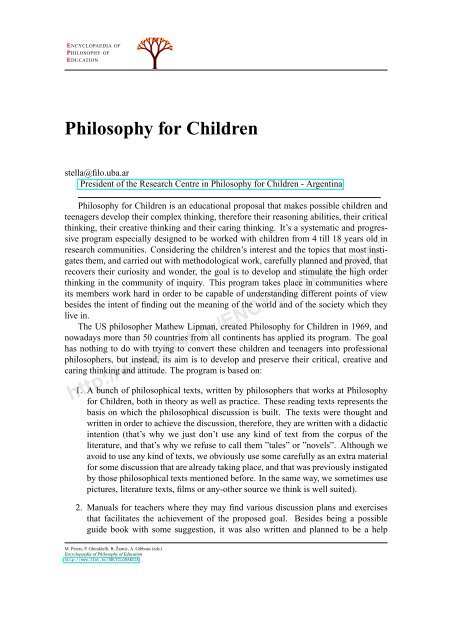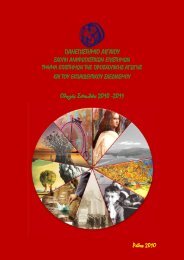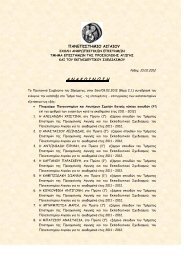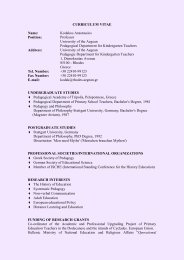Philosophy for Children
Philosophy for Children
Philosophy for Children
You also want an ePaper? Increase the reach of your titles
YUMPU automatically turns print PDFs into web optimized ePapers that Google loves.
ENCYCLOPAEDIA OF<br />
PHILOSOPHY OF<br />
EDUCATION<br />
<strong>Philosophy</strong> <strong>for</strong> <strong>Children</strong><br />
stella@filo.uba.ar<br />
President of the Research Centre in <strong>Philosophy</strong> <strong>for</strong> <strong>Children</strong> - Argentina<br />
<strong>Philosophy</strong> <strong>for</strong> <strong>Children</strong> is an educational proposal that makes possible children and<br />
teenagers develop their complex thinking, there<strong>for</strong>e their reasoning abilities, their critical<br />
thinking, their creative thinking and their caring thinking. It’s a systematic and progressive<br />
program especially designed to be worked with children from 4 till 18 years old in<br />
research communities. Considering the children’s interest and the topics that most instigates<br />
them, and carried out with methodological work, carefully planned and proved, that<br />
recovers their curiosity and wonder, the goal is to develop and stimulate the high order<br />
thinking in the community of inquiry. This program takes place in communities where<br />
its members work hard in order to be capable of understanding different points of view<br />
besides the intent of finding out the meaning of the world and of the society which they<br />
live in.<br />
The US philosopher Mathew Lipman, created <strong>Philosophy</strong> <strong>for</strong> <strong>Children</strong> in 1969, and<br />
nowadays more than 50 countries from all continents has applied its program. The goal<br />
has nothing to do with trying to convert these children and teenagers into professional<br />
philosophers, but instead, its aim is to develop and preserve their critical, creative and<br />
caring thinking and attitude. The program is based on:<br />
http://www.ffst.hr/ENCYCLOPAEDIA/<br />
1. A bunch of philosophical texts, written by philosophers that works at <strong>Philosophy</strong><br />
<strong>for</strong> <strong>Children</strong>, both in theory as well as practice. These reading texts represents the<br />
basis on which the philosophical discussion is built. The texts were thought and<br />
written in order to achieve the discussion, there<strong>for</strong>e, they are written with a didactic<br />
intention (that’s why we just don’t use any kind of text from the corpus of the<br />
literature, and that’s why we refuse to call them ”tales” or ”novels”. Although we<br />
avoid to use any kind of texts, we obviously use some carefully as an extra material<br />
<strong>for</strong> some discussion that are already taking place, and that was previously instigated<br />
by those philosophical texts mentioned be<strong>for</strong>e. In the same way, we sometimes use<br />
pictures, literature texts, films or any-other source we think is well suited).<br />
2. Manuals <strong>for</strong> teachers where they may find various discussion plans and exercises<br />
that facilitates the achievement of the proposed goal. Besides being a possible<br />
guide book with some suggestion, it was also written and planned to be a help<br />
M. Peters, P. Ghiraldelli, B. Žarnić, A. Gibbons (eds.)<br />
Encyclopaedia of <strong>Philosophy</strong> of Education<br />
http://www.ffst.hr/ENCYCLOPAEDIA
<strong>for</strong> the teachers any time they need. The writing of these books presumes that we<br />
find ourselves in the presence of a program that’s not only philosophical but as<br />
well educational, which demands an ethical commitment of giving continuity to the<br />
teacher’s <strong>for</strong>mation and total chances, by the teachers and schools, to put into effect<br />
the program.<br />
3. A <strong>for</strong>mation program <strong>for</strong> teachers, that will allow them to extract all the possibilities<br />
from the texts, assuring them that the task that’s being per<strong>for</strong>med is the development<br />
of the complex thought and the philosophical discussion and not something<br />
”similar” (scientific and religious discussion, or group therapy).<br />
4. Pedagogic methodology that tends to trans<strong>for</strong>m the class into an community of<br />
inquiry.<br />
Curriculum<br />
The philosophical issues are presented in a daily language. The program has been structured<br />
in different levels, that corresponds to different ages and courses. It presents a<br />
sequential order, in such a way that the same plot is restudied in a deeper way in a higher<br />
level, and at the same time new subjects are introduced.<br />
According to the possibilities, and the children’s interests and necessities, it’s possible<br />
to organise the following schedule, that is supposed to be worked in a spiral manner and<br />
which plots should be recaptured each time more deeply.<br />
1. First approach to the methodological basic points that tends to develop the ability<br />
of communication, of expression, participation and co-operation among the kids.<br />
Concepts like ambiguity , identity, name, family, tastes, truth, lies are introduced.<br />
http://www.ffst.hr/ENCYCLOPAEDIA/<br />
2. It’s focused on the acquisition of language, attending to the rational <strong>for</strong>ms that are<br />
implicit in the kid’s daily conversation. Also puts emphasise on the intensification<br />
of the perceptive consciousness, on sharing perspectives through the philosophical<br />
discussion, in the similarities, distinctions and classifications and by thinking over<br />
it’s own daily experience.<br />
3. As soon as the kids are already familiar to the knowledge of a plural and dynamic<br />
(constant changes) reality, they are prepared to start thinking about the language.<br />
At this stage, the semantics and syntactics structures, the detection of speech vagueness,<br />
the discussion of concepts that establishes relation and philosophical notion,<br />
such as, casualness, space, individual, class, are paid more attention.<br />
4. The students are introduced into the logic field, going through not only the language,<br />
but specific areas as ethical and social research as well. All this work, as<br />
always occurs in the program, goes on according to the kids’ interests, and in no<br />
way, logic is ”taught”. Our task with the program is to work as midwives: the child<br />
2
that is to be born is in the students and not in us (at least not at the moment in which<br />
we are supposed to co-ordinate the philosophical discussion, in which, as adults, we<br />
shouldn’t give our opinion, but instead make questions in order to help the students<br />
in this wisdombirth). The main reason to have <strong>for</strong>mal logic in the curriculum is to<br />
help the students finding out they can think about their own thoughts in an organised<br />
way. Formal logic contains the criteria in which one can discriminate between the<br />
valid reasoning and any other kind which it isn’t, and in this sense, it’s an important<br />
subject among all science and essential when thinking education as a way to improve<br />
the thoughts. At this phase, from a variety of situation and on the detection<br />
of applications that shows how it can be used, the discoveries and awareness of the<br />
<strong>for</strong>mal logic rules are focused. As the kids are already familiar to their own language,<br />
a <strong>for</strong>mal logic system useful <strong>for</strong> this is syllogistic logic, which main features<br />
are: consistency, or lack of contradictions, logic consequence, or the way in which,<br />
according to the rules, allows to go from one sentence to others and coherence, or<br />
the way in which the rules are in accordance in a whole united and systematic. Because<br />
of the limited application of this kind of logic, the focus on good reason are<br />
also worked, introducing in<strong>for</strong>mal logic, that permits to evaluate one’s thoughts and<br />
others in relation to the actions and happenings. This focus doesn’t present any particular<br />
rule besides insisting on the search <strong>for</strong> good reasons in a particular situation<br />
and appreciate the reasons that were offered. It’s worked with the kids accomplishing<br />
impartiality, objectivity, respect <strong>for</strong> people, being a primary aim helping the<br />
members of the research community to discover a great number of applications a<br />
structured deliberative thought presents and stimulate them to use the reflections<br />
thought actively in their lives. The main ef<strong>for</strong>t in this teaching consists in maintaining<br />
the research process and stimulate reasons’ assessment. With this process, that<br />
is supposed to be worked in a transverse way, ethical and social research field are<br />
developed.<br />
http://www.ffst.hr/ENCYCLOPAEDIA/<br />
5. The emphasis are put on the deepness of the philosophic specialisation as ethic,<br />
aesthetic, metaphysic and gnoseologic research.<br />
Each unity of the program – texts <strong>for</strong> the students and the extra material <strong>for</strong> the teachers<br />
is a thematic group that gradually introduces to the class group the personal and dialogic<br />
thought. Even though the units present a graduation in the questions difficulties that<br />
are presented, each one is independent from the other and can be administrated during<br />
one or two years to the same class group.<br />
The main objective of each book in the program is to supply the readers with elements<br />
capable of making them aware of their own thoughts and the way in which one’s thoughts<br />
may work in their lives. The book is, there<strong>for</strong>e, the starting point <strong>for</strong> the philosophical<br />
discussion.<br />
On the following page there is a <strong>Philosophy</strong> <strong>for</strong> <strong>Children</strong> program schedule, with the<br />
details about the texts, teacher’s manual, area belonging to and a frame with the application’s<br />
school’s levels.<br />
3
Aproach to the philosophical discussion instruments<br />
In Introducción a Filosofía para Nińos. [Be<strong>for</strong>e working with the texts.]<br />
STUDENT’S TEACHER’S GUIDE- AREACOURSEAGE ALLOWANCE<br />
BOOK<br />
BOOK<br />
AGE<br />
Lis<br />
Wondering at my experience<br />
Introduction- Initial- 5 - 6 4 - 7<br />
Language 1st year<br />
<strong>Philosophy</strong><br />
Rebeca Discovering the world Language 2nd.- 6 - 8 6 – 8<br />
Phi-<br />
3rd .<br />
los-<br />
year<br />
o-<br />
phy<br />
Thinking, stories,gation<br />
Ethic and Social Investi-<br />
Ethic4th.-5th<br />
9 - 10 9–11<br />
and<br />
Social<br />
Science<br />
year<br />
Lisa Ethic Investigation Logic6th . – 11 - 12 10 - 12<br />
and 7th year<br />
Ethic<br />
Suki Writing: how and why Logic8th<br />
13 - 14 12 - 14<br />
and – 9th<br />
Aes-<br />
year<br />
http://www.ffst.hr/ENCYCLOPAEDIA/<br />
Golden city Going towards my assumption<br />
thetic<br />
Metaphysic High<br />
and school<br />
Gnoseologic<br />
15 –17 14 –18<br />
Community of Inquiry<br />
As the aim of <strong>Philosophy</strong> <strong>for</strong> <strong>Children</strong> is to prompt a philosophical behaviour and the<br />
children have a remarkable tendency to the verbal expression, the most appropriate pedagogic<br />
methodology is the philosophical discussion. Starting from various sources the<br />
dialogue is instigated from the basic level, once it’s an appropriate environment <strong>for</strong> the<br />
4
children to express mutually their ideas, learning to listen to their partners’ response, they<br />
over come the feeling that what they have to say is absurd or out of place, confirming it<br />
with the classmates, in such a way that the experience from others is a teaching.<br />
Trans<strong>for</strong>ming the class into an community of inquiry is considered to be essential in<br />
order to stimulate the kids on thinking and behaving in a higher level than the one they<br />
would have per<strong>for</strong>med alone: a genuine community of inquiry is based on the mutual<br />
respect and on the member’s volunteer commitment to search <strong>for</strong> something in common.<br />
For ”inquiring” we understand the constant in the self correction exploration of plots that<br />
at the same time are realised as something important and problematic. From this theoretic<br />
perspective, to learn something is to learn it again with the same discovery spirit that was<br />
once experienced when it was discovered, or with the same spirit of invention that was<br />
predominant when it was invented.<br />
By the philosophical discussion in the centre of the community of inquiry, the children<br />
may achieve their own point of view and their own conclusions. <strong>Philosophy</strong> insists on the<br />
strict logic, but only as a mean to produce a more effective thinking, and not in the sense of<br />
achieving a total concordance among all the ideas. The program emphasis the discussion<br />
process and not the achievement of a particular conclusion (the process is worth, not the<br />
product). Even though no philosophical subjects are taught, the teacher must use the typical<br />
philosophical way of thinking and questioning. Gradually, the students begin to find<br />
out that a philosophical discussion presents a different pattern from any other discussion,<br />
they start to realise that they can share ideas, experience and perspectives among each<br />
other. They start to appreciate other’s point of view and realise the importance to give<br />
reasons that support their opinion. It makes sense, then, the objectivity, and the necessity<br />
of examining carefully the problems instead of getting satisfied with only expressing their<br />
ideas in a raw and superficial way, or making a monologue pretending to be a dialogue. It<br />
makes sense the philosophical discussion in an community of inquiry.<br />
http://www.ffst.hr/ENCYCLOPAEDIA/<br />
Objectives<br />
The children get wondered and ask themselves not only about them, but also about the<br />
world and the society in which they live in, and they have the necessity to find a meaningful<br />
reference frame to the puzzling realities. They try to clarify the environment by a<br />
scientific explanation, through some kind of history capable of supplying a useful interpretation<br />
in the symbolic ambit or <strong>for</strong>mulating the matter philosophically in a questioning<br />
manner. Some of the questions they usually ask are; ”What is the mind?”, ”What is reality?”<br />
, ”What are the things?”, ”What is goodness?”, What is fairness?”, based on what<br />
we know, ”what can we find out?”, and they can be considered philosophical questions<br />
(once the questions or the concepts aren’t philosophicals by itself, but in the meaning net<br />
that the research community assigns).<br />
<strong>Philosophy</strong> <strong>for</strong> <strong>Children</strong> proposes to promote a distinct pedagogic modality since the<br />
philosophy, in which the in<strong>for</strong>mative and the <strong>for</strong>mative make part of the same unity. The<br />
aims do not end with the development of cognitive abilities (neither is tried to develop<br />
5
in steps the cognitive ability in order to accomplish next the complex thinking. As the<br />
complex thinking is developed the cognitive abilities are achieved) otherwise is orientated<br />
to <strong>for</strong>m reasonable people, in which involves a sociability instance in the reasoning<br />
.Besides the development of cognitive abilities ( abilities in reasoning, in inquiring , in<br />
conceptual analysis, in interpretation) and the work with philosophical concepts (”truth”,<br />
”justice”, ”beauty”, ”goodness”, ”language”, ”liberty”, ”identity”), the program is worried<br />
about behaviours and habits such as; developing the ability of self-correction, learning<br />
how to listen to other people, paying attention and trying hard in order to understand,<br />
asking <strong>for</strong> and giving reasons, among others. Obviously the <strong>for</strong>mative phase overtakes<br />
the philosophical domain as these abilities also belong to other areas of the knowledge.<br />
Nevertheless, these habits and behaviours are crucial <strong>for</strong> the existence of a democratic<br />
society.<br />
It’s important to teach the children how to think <strong>for</strong> themselves, so that they are capable<br />
of renovating creatively and carefully the society in which they live in, and at the<br />
same time be able to grow up in a critical, careful and creative way. By saying that education<br />
must allow the students to develop the instruments they need in order to evaluate<br />
carefully, creatively and critically the social expectations, it means that education must<br />
tend to develop human beings capable of evaluating the world and oneself, as well as<br />
expressing fluently and creatively besides caring <strong>for</strong> others.<br />
On the following some of the specific aims of <strong>Philosophy</strong> <strong>for</strong> <strong>Children</strong>:<br />
• <strong>Children</strong> and teenagers develop their reasoning capacity (derive inference of different<br />
kind, classify and categorize , work with coherence and contradiction, <strong>for</strong>mulate<br />
questions, identify assumptions, <strong>for</strong>mulate cause-effect relation, knowing and<br />
avoiding - or at least know how to use – language vagueness, distinguish ambiguities,<br />
recognize interdependence between means and results, define terms, identify<br />
and use criterion, exemplify, built hypothesis, context, anticipate, predict and estimate<br />
the consequences, generalize, find out in<strong>for</strong>mal deceitfulness, normalize daily<br />
language phrases);<br />
http://www.ffst.hr/ENCYCLOPAEDIA/<br />
• Develop one’s creative thinking;<br />
• Familiarize oneself with the practice of the caring thinking;<br />
• Develop one’s capacity to find out the meanings of experience (find out connections,<br />
alternatives, offer some reasons, relations between part-whole and whole-part, detect<br />
and recongnize incoherence).<br />
To achieve the development and co-ordination of these thinking abilities it’s required<br />
a gradual and systematic process, nevertheless, it’s needed a cognitive aptitude <strong>for</strong> implementing<br />
those, further than the abilities themselves. This aptitude is consisted of cooperation,<br />
trust, self-appreciation, attention, respect <strong>for</strong> people, among others. <strong>Philosophy</strong><br />
<strong>for</strong> <strong>Children</strong> believes these attitudes are stimulated when the class is trans<strong>for</strong>med into a<br />
dialogic seminar committed to inquiry. It’s assumed that dialogue produces cogitation;<br />
6
people who participate in a dialogue have to cogitate, to concentrate in what is being said,<br />
to evaluate different alternatives, have to pay careful attention to the definitions and significance,<br />
to recognize different options that haven’t been aware of, and in general, have<br />
to per<strong>for</strong>m a great number of mental activities. Participants reproduce in their own thinking<br />
process the structure and the dialogue progress taken place in class. A thesis based<br />
on the social and cognitive psychology, that claims thinking is the interiorization of the<br />
dialogue. ”Dialogue” meaning not just any kind of conversation, but it’s referred to the<br />
dialogue in which aims an elaboration of the thinking from the contribution of others. For<br />
that reason, the community of inquiry is the place where the group’s self-appreciation and<br />
the process will be cared, in which the aptitude is meant to appreciate and criticise one’s<br />
reasoning as well as the mate’s. It will be trusted that the group’s procedures are reliable<br />
as they are self-corrected. When this becomes habitual, a following support is provided<br />
to the social and individual <strong>for</strong>ming character.<br />
Finally<br />
<strong>Philosophy</strong> <strong>for</strong> <strong>Children</strong> is an alive organism. There<strong>for</strong>e, it’s creator, Dr. Mathew Lipman,<br />
up-holds and stimulates each country or region to develop it’s own curriculum, according<br />
to the children’s interest and necessity, and the research and writing capacity of each <strong>Philosophy</strong><br />
<strong>for</strong> <strong>Children</strong> Centre. Dr. Lipman wrote his own curriculum, between 1969 and<br />
1980, which titles are; Elfie (6 to 7 years old), Kio and Gus (8-9 years old), Pixie (9-10<br />
years old), Harry Stottlemeier’s Discovery (11-12 years old), Lisa (11-12 years old), Suki<br />
(12- 14 years old) and Mark (15-18 years old). These texts, with their corresponding<br />
support manuals, constitute the traditional program. Some of the texts haven’t been used<br />
lately in some parts of the world. More than twenty years has passed since they were written,<br />
there<strong>for</strong>e some of them don’t instigate the students from the XXI century any more.<br />
Others experts from the program with their critical, creative and caring ef<strong>for</strong>t are elaborating,<br />
writing, and publishing new texts <strong>for</strong> the program (as it happens in Argentina), that<br />
respects, amplifies, and turns into more complex the initial idea. It continues to be caring,<br />
creative and critical, and from the contribution of the philosophy introduced in education<br />
since early ages, goes on thinking about the teachers, the students and in a better world<br />
<strong>for</strong> everyone.<br />
http://www.ffst.hr/ENCYCLOPAEDIA/<br />
References<br />
ACCORINTI, S., Introducción a Filosofía para Nińos, Buenos Aires, Manantial, 1999<br />
ACCORINTI, S., Trabajando en el aula. La práctica en Filosofía para Nińos, Buenos<br />
Aires, Manantial, 2000<br />
ACCORINTI, S., Lis, Buenos Aires, Manantial, 2000<br />
ACCORINTI, S., Maravillándome con mi experiencia, Buenos Aires, Manantial, 2000<br />
7
CAM, P., Historias para pensar, trad. H. Pons, revisión técnica y adaptación S. Accorinti<br />
G. Arbonés, Buenos Aires, Manantial, 1999<br />
CAM, P., Manual de apoyo para acompańar a Historias para pensar, trad. H. Pons,<br />
revisión técnica G. Arbonés y S. Accorinti, Buenos Aires, Manantial, 1999<br />
LIPMAN, M. et al., La filosofía en el aula, trad. García Moriyón y otros, Madrid, De<br />
la Torre, 1993<br />
LIPMAN, M., Thinking in education, Cambridge University Press, 1991<br />
LIPMAN, M., Suki, trad César Aira, revisión técnica y adaptación G.Arbonés- S.Accorinti,<br />
Buenos Aires, Manantial, 2000<br />
LIPMAN, M., Escribir: cómo y por qué, trad. César Aira, revisión técnica y adaptación<br />
S.Accorinti- G.Arbonés, Buenos Aires, Manantial, 2000<br />
LIPMAN, M., Lisa, trad. H. Pons, revisión técnica y adaptación G. Arbonés - S.<br />
Accorinti, Buenos Aires, Manantial, 1999<br />
LIPMAN, M., Pensamiento complejo y educación, trad. V. Ferrer, Madrid, de la<br />
Torre, 1997<br />
LIPMAN, M., <strong>Philosophy</strong> goes to School, Philadelphia, Temple University Press,<br />
1988.<br />
LIPMAN, M., Thinking <strong>Children</strong> and Education, Iowa, Kendall/Hunt Publishing Company,<br />
1993.<br />
REED, R., Rebeca, trad. H. Pons, revisión técnica y adaptación G. Arbonés y S.<br />
Accorinti, Buenos Aires, Manantial, 1999<br />
Encyclopedia of <strong>Philosophy</strong> of Education<br />
25/03/2000<br />
http://www.ffst.hr/ENCYCLOPAEDIA/<br />
8






